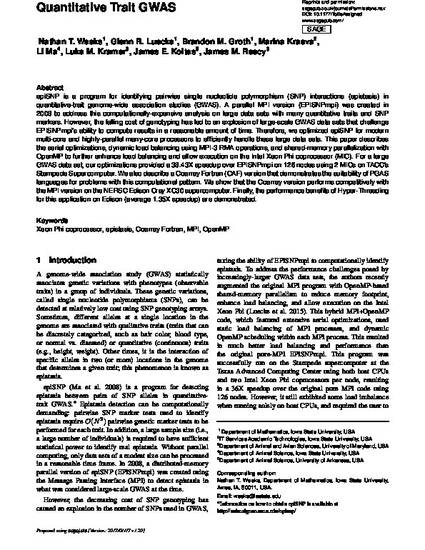
epiSNP is a program for identifying pairwise single nucleotide polymorphism (SNP) interactions (epistasis) in quantitative-trait genome-wide association studies (GWAS). A parallel MPI version (EPISNPmpi) was created in 2008 to address this computationally expensive analysis on large data sets with many quantitative traits and SNP markers. However, the falling cost of genotyping has led to an explosion of large-scale GWAS data sets that challenge EPISNPmpi’s ability to compute results in a reasonable amount of time. Therefore, we optimized epiSNP for modern multi-core and highly parallel many-core processors to efficiently handle these large data sets. This paper describes the serial optimizations, dynamic load balancing using MPI-3 RMA operations, and shared-memory parallelization with OpenMP to further enhance load balancing and allow execution on the Intel Xeon Phi coprocessor (MIC). For a large GWAS data set, our optimizations provided a 38.43× speedup over EPISNPmpi on 126 nodes using 2 MICs on TACC’s Stampede Supercomputer. We also describe a Coarray Fortran (CAF) version that demonstrates the suitability of PGAS languages for problems with this computational pattern. We show that the Coarray version performs competitively with the MPI version on the NERSC Edison Cray XC30 supercomputer. Finally, the performance benefits of hyper-threading for this application on Edison (average 1.35× speedup) are demonstrated.
Available at: http://works.bepress.com/james_reecy/139/

This is a manusript of an article published as Weeks, Nathan T, Glenn R Luecke, Brandon M Groth, Marina Kraeva, Li Ma, Luke M Kramer, James E Koltes, and James M Reecy. “High-Performance Epistasis Detection in Quantitative Trait GWAS.” The International Journal of High Performance Computing Applications (2016). doi:10.1177/1094342016658110.